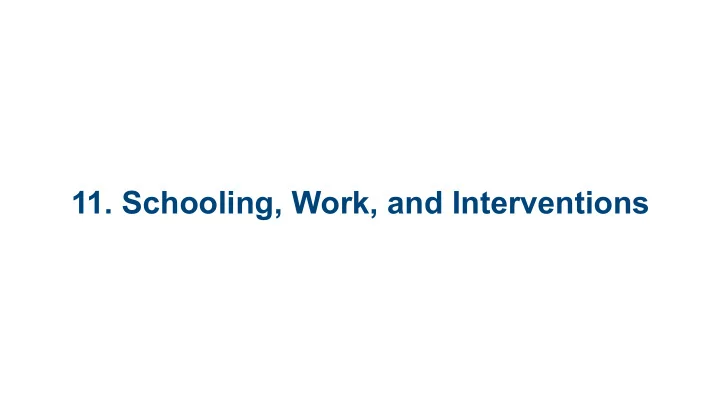

11. Schooling, Work, and Interventions
11.1 Day Care and Preschool 11.2 Applications of Developmental Principles 11.3 Operant Conditioning
11.4 Learning Styles 11.5 Intervention Programs and Services 11.6 Facilitation of Role Transitions
11.7 Occupational Development 11.8 Retirement 11.9 Elder Care
11.1 Day Care and Preschool
Daycare • For infants? Toddlers? • First exposure to other adults and peers • “High quality” = good ratios, interaction, activities • Can boost social skills and vocabulary • Can boost aggression
Preschool • Typically after toilet training • Curriculum and learning • Social/emotional • Language/literacy • Math awareness • Physical • Self-help
11.2 Applications of Developmental Principles
Early childhood learning • Piagetian principles • “Discovery learning”: active, hands-on exploring/experimenting • “Constructivism”
Early childhood learning • Vygotskian principles • Teachers scaffolding learning tasks in increments
Promoting achievement • In middle childhood and beyond • Appeal to intrinsic motivation: “Keep up your efforts” (not rewards) • Lessen anxiety: Achievement not hampered by anxiety if kept moderate
11.3 Operant Conditioning
School behavior management Promote wanted behavior • Reward with praise • Reward with objects, privileges • “Ripple Effect” bonus?
School behavior management Extinguish unwanted behavior • Ignore: withdraw reinforcement • Punish: give unpleasant • Time out: remove social contact • Take away privilege
11.4 Learning Styles
Learning preferences based on modality • Visual: pictures, shapes, graphs, text • Auditory: listening, rhythm, singing • Kinesthetic/tactile: object manipulation, body movement, rhythm
11.5 Intervention Programs and Services
Helping development • Early childhood screening for disabilities, autism, ADHD, school readiness ➔ Intervention programs • Mandated programs: intervention/support in schools, e.g. Title I • Job training programs for disabled (non-profit)
11.6 Occupational Development
Career ladder • Child: career awareness • Teen: tracking • Young adult: internship; entry-level position
Career ladder • Middle adult: expertise; promotion; entrepreneurship • Older adult: career peak; “pass baton”
11.7 Facilitation of Role Transitions
Coping with role change • Transition to student: impulse control, routines, time management • Transition to adult worker: schedule, personal finance, balance work/family • Transition to retirement: mentoring, alternate routines/activities
11.8 Retirement
If chosen, easier transition and more prepared than if forced Decision based on health, finances, outside interests
Time for avocations, education, volunteering, activism Downsizing?
11.9 Elder Care
Levels of care • Age in place: live at home with occasional support • Assisted living: facility with range of services for support and recreation • Nursing home: custodial and medical services • Danger of elder abuse
Recommend
More recommend